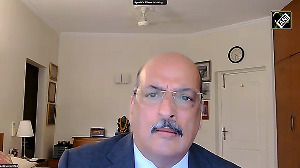In yet another surprise move that would have far reaching consequences to stem corruption at its very root in Uttar Pradesh, Chief Minister Mayawati on Monday resolved to end the "transfer industry" in the state.
She also sacked the heads of 30-40 public undertakings appointed by the the previous Mulayam Singh Yadav regime.
Most of them had been accorded either the rank of Cabinet minister or minister of state.
Mayawati, who rattled the state bureaucracy on her first day (Sunday) in office by affecting a major administrative shake-up across the state, is now out to send the message loud and clear that play of money that had become rampant in transfer of government officials, would now be brought to an end.
Ironically, like many other chief ministers, she was herself accused of giving fillip to the "transfer industry" in her three earlier stints as chief minister.
To ensure that none was able to raise a finger at her anymore, Mayawati took a policy decision at her first Cabinet meeting in Lucknow on Monday to relinquish her own powers to order transfers of officials.
The move is seen by critics as yet another discernable change in her style of functioning to prove that providing "good governance" was on top of her agenda in her fourth tenure now.
Briefing mediapersons in Lucknow, UP Cabinet Secretary Sheshank Shekhar Singh said, "All key appointments and transfers would be routed through the services establishment board and the chief minister would not deal with cases of officers below the rank of principal secretaries and additional directors general of police."
While the board always existed in the government system, it lost its sanctity and was virtually forgotten over the past two decades; at least when most transfers were ordered at the highest political level only.
However, as per Monday's decision, the bulk of the senior appointments would be decided at the cabinet secretary level.
"Transfers of departmental officers would be handled by their respective ministers, while those of junior Class I and Class II officers would be decided by principal secretaries, secretaries and heads of departments only," Singh told scribes.
"The chief minister had taken this decision essentially with a view to nipping the 'transfer industry' that had been thriving in the state so far," Singh added.
Referring to the firing of heads of public undertakings, Singh sought to point out, "Traditionally all such appointees themselves step down from their offices whenever there is a change of government; but since only three of roughly three dozen such persons had failed to do so, the state cabinet today decided to terminate their services with immediate effect."





